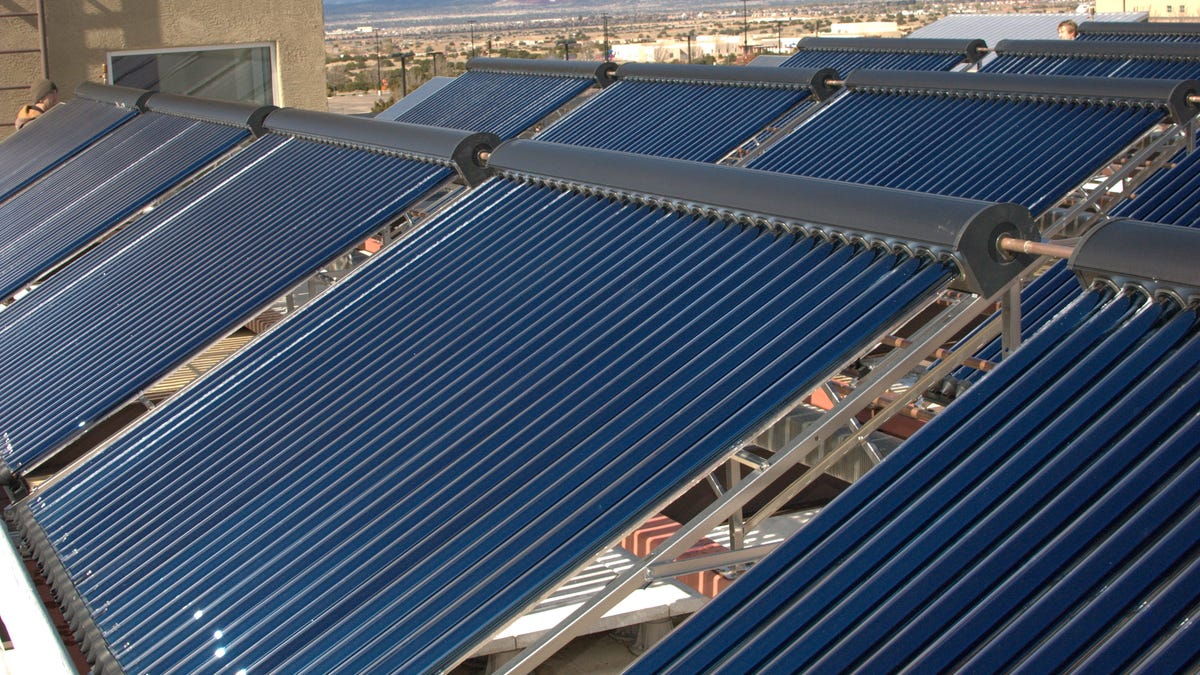A solar hot water collector that makes electricity, too
Startup GMZ Energy raises $14 million to make materials that convert heat to electricity, including a solar hot thermal product and chips to draw electricity from car exhaust pipes.

Startup GMZ Energy thinks solar hot water panels can pull double duty.
The company today announced it raised $14 million in series C funding to commercialize a product that will draw electricity from solar hot water collectors. It will also make small chips able to convert heat from car exhaust pipes and industrial machines into electricity.
GMZ Energy, which was spun out of the Massachusetts Institute of Technology and Boston College in 2008, has created an improved material for converting the energy in heat into electric power. The process works in reverse so an electric current will produce heat.
Thermoelectric materials have been used for years in a few applications, such as heated seats in cars and portable coolers. Now a number of companies are trying to make them less expensive and more efficient at the heat-to-electric power conversion.
GMZ Energy claims that its nano-engineered materials make their use viable for many other uses, such as turning waste heat into usable energy. It chose to develop a product in solar because it offers the quickest route to commercializing the technology, said CEO Aaron Bent.
Solar thermal collectors are widely used, particularly in Germany and China, and typically offer a quicker payback than solar electric, or photovoltaic, systems, he noted.
Through a contract manufacturer, the company plans to make a solar thermal collector made of evacuated tubes that includes its thermoelectric material in pellet form inside the tubes, Bent explained. The collectors, expected for testing by the end of 2012, will then be able to make both electricity and hot water and pay for themselves more quickly.
"We have a situation where the added costs to provide electricity is probably 3 times less expensive than PV (photovoltaics) on a dollar-per-watt basis," he said.
A solar hot water system for a typical German household equipped with its thermoelectric material could generate between one kilowatts and two kilowatts during peak times, Bent said. The hybrid system can reduce the payback time by about 20 percent although it depends on the solar resource and financial incentives for solar, he said.
The thermoelectric material is made of the traditional bismuth telluride material, but it's treated in a way to expose nano-scale grains on the surface, resulting in a boost in the heat-to-electricity efficiency. Company engineers have also designed the solar collector around the material to keep costs low, Bent said.
The company has collected an impressive group of investors for this round, following an industry trend of green technology startups partnering with large industrial concerns.
The investment was led by the venture capital arm of Japanese conglomerate Mitsui, which has invested in other energy-related companies. GMZ Energy is also now backed by Energy Technology Ventures, a joint venture created by General Electric, utility NRG Energy, and ConocoPhillips. Earlier investors Kleiner Perkins Caufield & Byers and BP Alternative Energy also participated in this round.
There are other approaches for producing hot water and electricity from solar panels, including solar electric panels fitted with hot water tubes underneath them. GMZ Energy's approach is aimed at drawing usable electricity from solar hot water collectors to make them more valuable
Updated at 9:10 a.m. PT with additional details.

